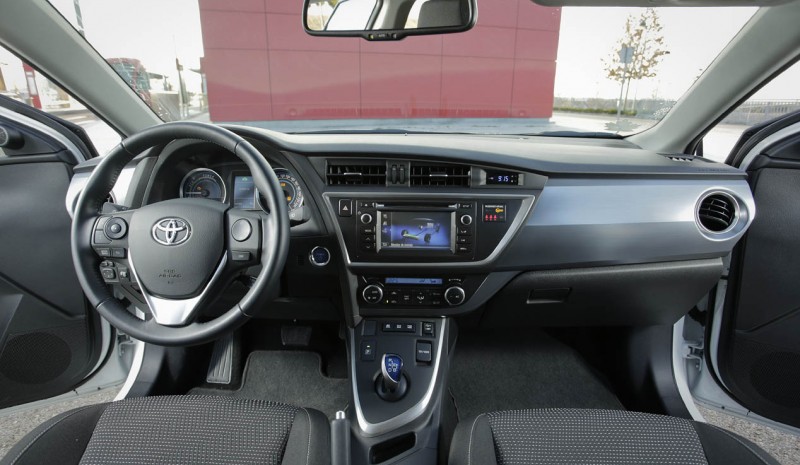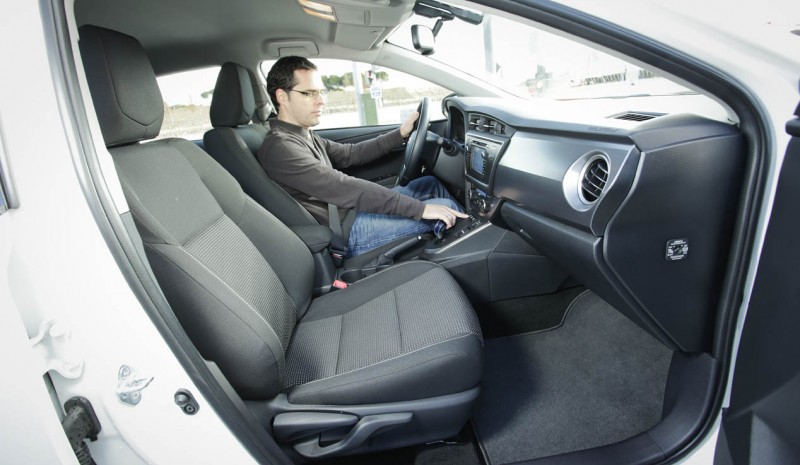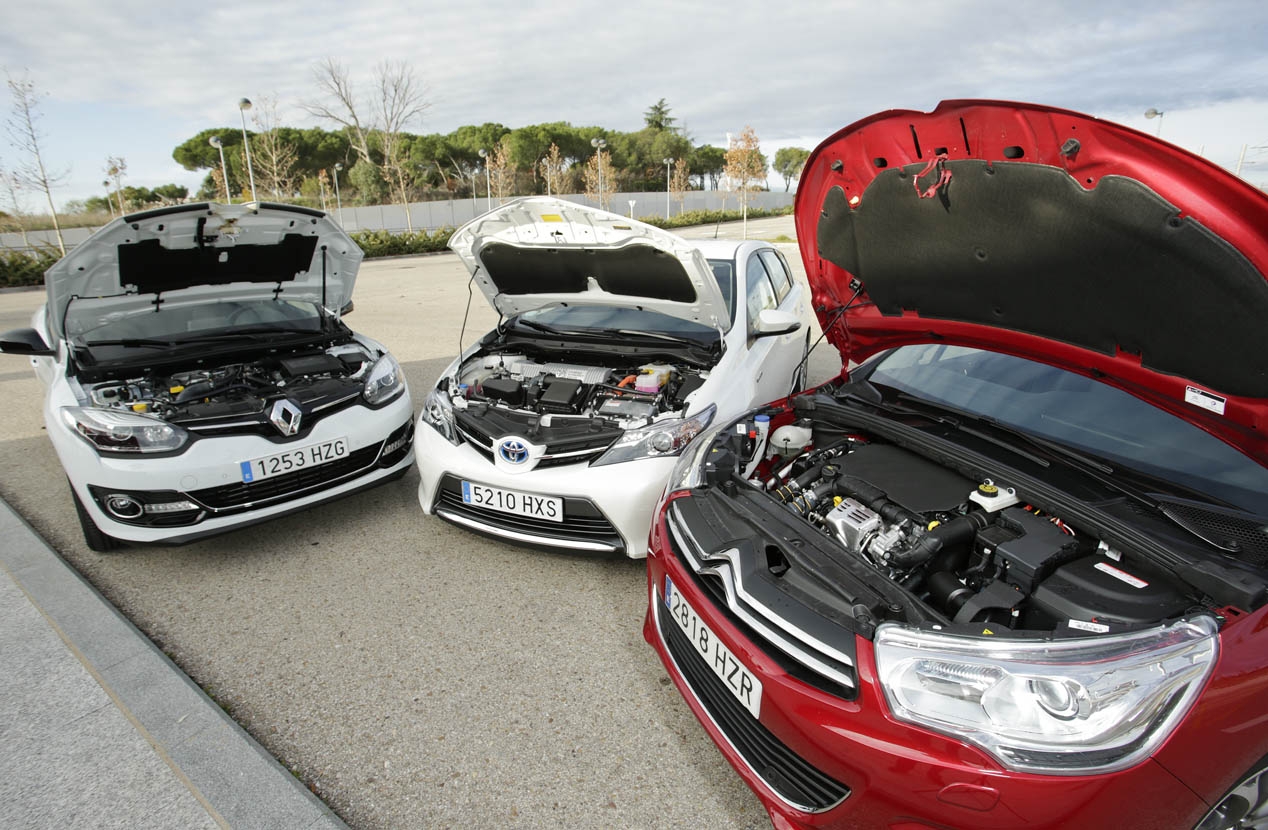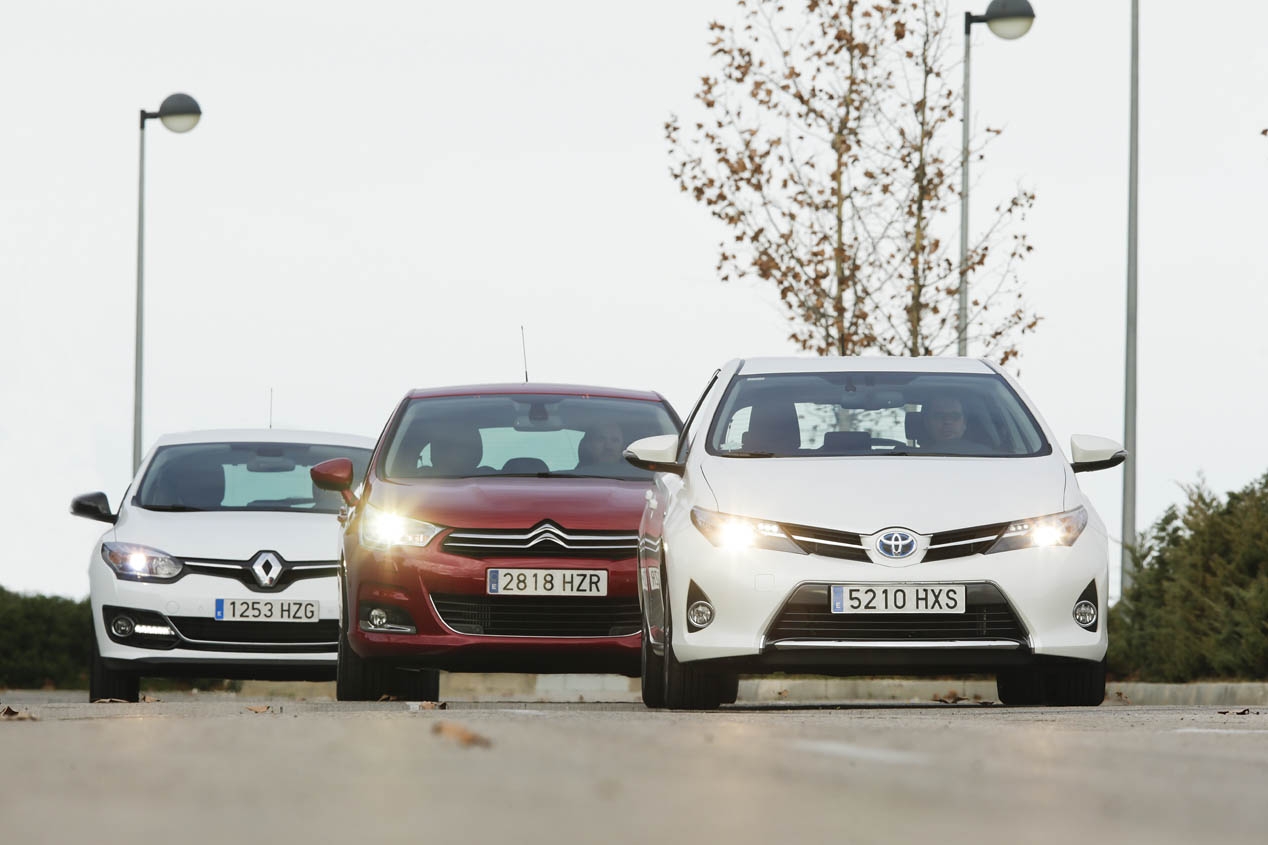Comparison: Citroën C4 PureTech 130 vs Renault Mégane TCe 130 and Toyota Auris Hybrid
Compared Citroen C4, Renault Megane and Toyota Auris petrol versions sobrealimentadas.¿Cuál is the best choice? ¿Turbo or hybridization? ¿3 or 4 cylinders?
Now that the Diesel begins to be pursued, market seems to look back to gasoline. We will not enter here today in demagogy, or we will open discussions on complex particle emission. It should be studied every car, every use and every Diesel specifically, qualifying if also Euro6 … or earlier. But there are realities that fall under its own weight. One, since he began to worry more CO2 than diesel has suffered a campaign of harassment in which there are those who ask until its ban in town. Another, that the technical evolution of gasoline engine and thus optimizing its performance, has happened in the last 5 years exponentially over a much more moderate in its progression Diesel.
And it is there, in a trend that has allowed today to bring back sales of gasoline Diesel (To be told about Ford Ecoboost so successfully and their TDCi) where we look now. Seeking greater efficiency around the time the gasoline engine, open hood this time three different alternatives for Citroen C4, Renault Megane and Toyota Auris. And it is in Citroën where we find, start, the most extreme case.
3 is greater than 4
so we start with the smallest proposal, the new PSA PureTech family group: a modern three-cylinder engine, 1.2 liters, direct injection, variable valve timing on intake and exhaust, and in their top version of 130hp. Ripped in the Citroën C4 and start, no trace of 3-cylinder gasoline engine or almost. not vibrate, sounds pretty serious and acceleration, and pushes much at low speeds. Thus, we confirmed and 95 percent of its peak torque between just 1,500 and 3,500 rpm up, and do not think that is enough, because their maximum 27.4 mkg also we measure less than 2,200 rpm, representing 40 percent and more torque and less than 2,500 rpm yielding its previous aspirated engine VTi 120 hp it replaces.
Was not that perhaps the Performance of a Diesel? This 1.2 PureTech response undoubtedly TDI (in fact, their values are almost traced to a current VW Golf 1.6 TDI) that takes you even ride developments also almost Diesel: I see myself rolling with this Citroën C4 in 6th to 120 km / h at just 2,300 rpm. It is the best you can with them, without needing practically never stretch their marches beyond 2,500 rpm. Which decays significantly at 5,000 rpm (again Diesel effect)? You will not need more, I assure.
So surprising that, by comparison, now made worse by until today very good engine 1.2 TCe also 130 hp, riding in his Renault Mégane for example. And it is that in this case the diamond mark bet identical with turbo engine, but on a block and cylinder 4. Very refined, delivery is also very remarkable, with 90 percent of its peak torque between 2,000 and 4,000 rpm … but always talking about rather lower values than those of Citroën. In fact, its lower pushing sensation is found in bank 5 mkg torque less than half the C4 (i.e. 20% less), feeling empty especially at low speeds.
This response Mégane 1.2 TCe of most common and a gasoline engine small displacement which, however, does not become either in this compact so critical that, for example, if I found a Nissan Qashqai which is also mounted on the lower version of 115 hp, thanks the lightness of Mégane (50 kg less even than C4) and shorter developments of change that allow then offset benefits the biggest push of a Citroen C4 in which some jump excessively long running (especially between 2nd and 3rd) also punishes something at the end of your records. Outside data (both good) practice will take you to feel more welcome and the superb engine response C4 1.2 PureTech.
Let’s talk about consumption
Unobstructed first unknown: within conventional gasoline engines I stay with the current 3-cylinder Citroen C4. So touch resolve the second. And it is that, before the new petrol engines, Toyota continues to claim its own space. It’s been a long time since the Japanese bet here hybridization, which it continues to be another way also boost … but in this case supported by a second electric motor instead of the turbo.
Yes, but look for that extra push to continually improve the performance of a small engine, the Toyota Auris Hybrid what this release is charging whenever you can to his “humble” main engine 99 HP 1.8 petrol. Always in this case focused on efficiency, Toyota Auris Hybrid to take your list if what you ask is a very fast and cutting sports car. Not that it’s a slow compact, because, in fact, standing thoroughly and entering Power mode can be thanks to its somewhat faster than its rivals in overtaking automatic. But in those cases, its operation is not very pleasant, as CVT then modifies its change ratio of motor rotation relative to the wheels, revolucionándolo in excess of quite upset regimes.
So better leave that prestacional character only for specific moments (repechos, overtaking or acceleration lanes) and draw best match comfort and the economy that comes to offer this Toyota Auris Hybrid, and I understand that the client who asks hybrid will. Because saved those moments cold start always critical (and here last a couple of kilometers or less than 5 minutes at most in which the heat engine piecework) the efficiency of this Toyota Auris is fantastic.
With enough thrust to move you, and great insulation while you stay in your Eco zone instrumentation, in town You will not find a nicer car Toyota Auris Hybrid this out of pure electric cars. Not even a smaller Yaris Hybrid, because the compact has a more powerful electric motor (82 hp versus 61) and longer battery capacity (1.3 kWh vs. 0.9) to allow better electrical use (at best, 2 km in EV mode up to 50 km / h), and faster recharge battery or with the heat engine generator moving either recovering kinetic energy in braking.
Total silence march, minimal hitches between modes of use … and finally, 3 to 4 l / 100 km less consumption in town this Toyota Auris Hybrid in the Citroën C4 and Renault Megane. Unchallenged there (on average, 4.5 l / 100 km), and better the more we use between streets, its advantage is that it also takes advantage also on the road. Unlike highway diesel engines that can be more efficient, these new petrol and Citroen and Renault are then rolling over 6.5 l / 100 km on average (And its turbo and low displacement are much more sensitive to requests great acceleration they always take over 10 l / 100 km in these cases), while the Toyota Auris Hybrid still spending on expressways just over 5 l / 100 km. Too real advantage today still for a hybrid that is closer in performance to Citroën C4 and Renault Megane, what they approach the Auris efficiency.
Touch and precision
and also clear the “X” final performance, we did not conclude this confrontation between powertrains without talking about what, too, you will find hand. And this time, we talk about three cars very different profile and where Mégane Renault undoubtedly is the most spread. Plus agile and light, and more direct steering and change, is the Mégane and the funniest and accurate. Car, despite his seniority, continues to provide first class performance without also giving up comfort more than acceptable rolling. Is a very good compact.
More, however, it is noticing time in a Citroën C4 that, although just disguise its appearance does not change technical scheme or mechanical assembly. Not a bad compact and its perceived quality is good, but average and an abyss in front of a new Peugeot 308 of the French group. It notes and at the touch of your address (incidentally, one of the few remaining electrohydraulic category) and excessive self-centered (in sharp turns to avoid detours must accompany path), and also in a Worst final quality of suspensions: It is comfortable on a day to day but firm circular or irregular high frequency bumps to feel worse enough cushioning.
Meanwhile, despite its technical feature, the Toyota Auris Hybrid continues to be a very balanced compact. True, there is the greater weight of motors and batteries (70 to 115 kg more than its rivals), and It is not therefore the most agile of its kind, but with a good and precise touch controls, a firmness of suspensions, without being as dry as a Toyota Prius, remain much body roll, and corrections electronics offset their higher inertia, it ends up being a pleasant, easy and secure compact. An already normal car, where neither its peculiar brake feel (though it has less resistance to fatigue, offers very good distances), or your space (when installing batteries under the rear seats won 135 liters of boot), and its price (despite its technical complexity costs like this Citroën C4, and less than the Mégane Renault) are already conditioning. Definitely, Toyota seems to have already repaid its ambitious hybrid bet.






